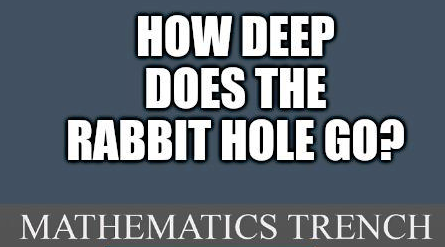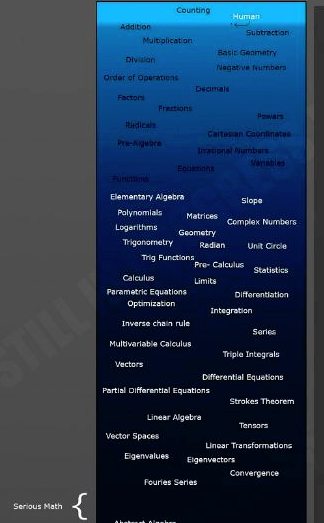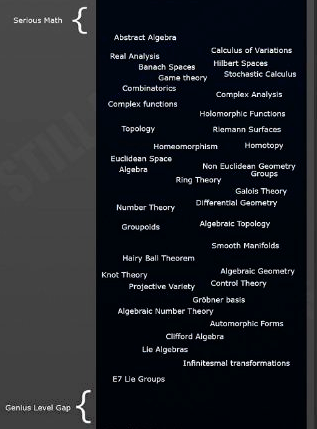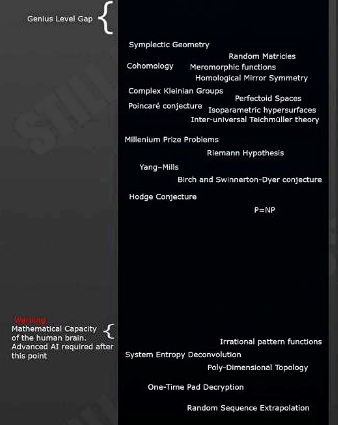Copied from Reddit.




If you have trouble reading these I can try sharpening the image up a bit.
Copied from Reddit.




If you have trouble reading these I can try sharpening the image up a bit.
The are just about readable when opened in a new window, but higher res would be better.
I’d group all of the first page as “useful maths” and all the rest as “stuff mathematicians find interesting”.
The Rev Dodgson said:
The are just about readable when opened in a new window, but higher res would be better.I’d group all of the first page as “useful maths” and all the rest as “stuff mathematicians find interesting”.
Pretty much. Some at the top of the second page have applications. Calculus of variations can appear in Engineering, even civil engineering.
Further down, differential geometry makes an appearance in General Relativity.
Control theory is actually quite useful in Chemical Engineering Where you have process flow charts that have to be optimised for maximum output and maximum safety (avoiding dangerous transients).
Lie algebras and Lie groups make an appearance in quantum mechanics.
And of course Yang-Mills is quantum electroweak and quantum chromodymamics.
mollwollfumble said:
The Rev Dodgson said:
The are just about readable when opened in a new window, but higher res would be better.I’d group all of the first page as “useful maths” and all the rest as “stuff mathematicians find interesting”.
Pretty much. Some at the top of the second page have applications. Calculus of variations can appear in Engineering, even civil engineering.
Further down, differential geometry makes an appearance in General Relativity.
Control theory is actually quite useful in Chemical Engineering Where you have process flow charts that have to be optimised for maximum output and maximum safety (avoiding dangerous transients).
Lie algebras and Lie groups make an appearance in quantum mechanics.
And of course Yang-Mills is quantum electroweak and quantum chromodymamics.
“Calculus of variations can appear in Engineering, even civil engineering”
I even have a couple of books on the subject.
So our categories have fuzzy edges.
What is the maths of fuzzy Venn diagrams called?
That certainly goes in the useful category.
The Rev Dodgson said:
mollwollfumble said:
The Rev Dodgson said:
The are just about readable when opened in a new window, but higher res would be better.I’d group all of the first page as “useful maths” and all the rest as “stuff mathematicians find interesting”.
Pretty much. Some at the top of the second page have applications. Calculus of variations can appear in Engineering, even civil engineering.
Further down, differential geometry makes an appearance in General Relativity.
Control theory is actually quite useful in Chemical Engineering Where you have process flow charts that have to be optimised for maximum output and maximum safety (avoiding dangerous transients).
Lie algebras and Lie groups make an appearance in quantum mechanics.
And of course Yang-Mills is quantum electroweak and quantum chromodymamics.
“Calculus of variations can appear in Engineering, even civil engineering”
I even have a couple of books on the subject.
So our categories have fuzzy edges.
What is the maths of fuzzy Venn diagrams called?
That certainly goes in the useful category.
You could try this? https://math.stackexchange.com/questions/299521/fuzzy-venn-diagram-regions-labeled-in-ternary
roughbarked said:
The Rev Dodgson said:
mollwollfumble said:Pretty much. Some at the top of the second page have applications. Calculus of variations can appear in Engineering, even civil engineering.
Further down, differential geometry makes an appearance in General Relativity.
Control theory is actually quite useful in Chemical Engineering Where you have process flow charts that have to be optimised for maximum output and maximum safety (avoiding dangerous transients).
Lie algebras and Lie groups make an appearance in quantum mechanics.
And of course Yang-Mills is quantum electroweak and quantum chromodymamics.
“Calculus of variations can appear in Engineering, even civil engineering”
I even have a couple of books on the subject.
So our categories have fuzzy edges.
What is the maths of fuzzy Venn diagrams called?
That certainly goes in the useful category.
You could try this? https://math.stackexchange.com/questions/299521/fuzzy-venn-diagram-regions-labeled-in-ternary
Thanks for that.
It seems that Rev. Dodgson I had something to say on the matter:
“Lewis Carroll explores diagrams and methods in Symbolic Logic and the Game of Logic, but this is a less relevant and rather old fashioned treatment.”
The Rev Dodgson said:
roughbarked said:
The Rev Dodgson said:“Calculus of variations can appear in Engineering, even civil engineering”
I even have a couple of books on the subject.
So our categories have fuzzy edges.
What is the maths of fuzzy Venn diagrams called?
That certainly goes in the useful category.
You could try this? https://math.stackexchange.com/questions/299521/fuzzy-venn-diagram-regions-labeled-in-ternary
Thanks for that.
It seems that Rev. Dodgson I had something to say on the matter:
“Lewis Carroll explores diagrams and methods in Symbolic Logic and the Game of Logic, but this is a less relevant and rather old fashioned treatment.”
:)